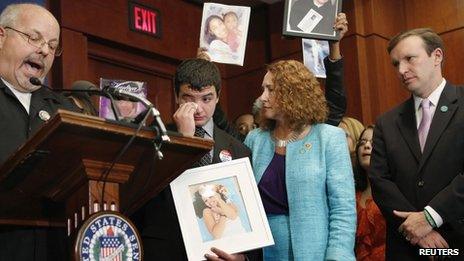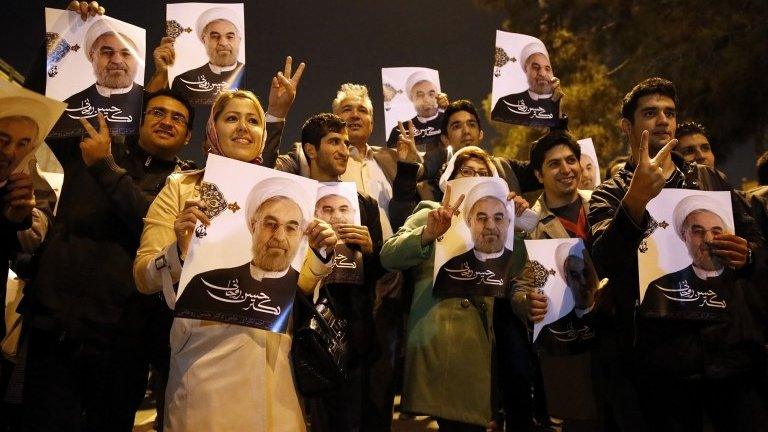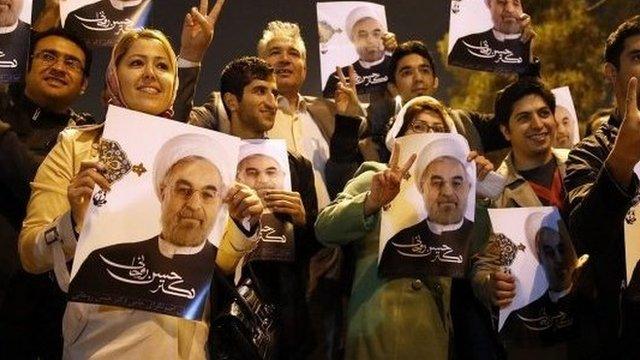Lessons from Newtown killings
- Published
Hundreds gathered at Washington's National Cathedral to remember those who lost their lives at Sandy Hook Elementary School
Little flames flicker in their red holders, beside the statue of St Rose of Lima in a corner of Newtown's Catholic church.
Monsignor Bob Weiss says the candles, marking prayers for the dead, have been replaced twice since last weekend.
No-one here can forget what happened on 14 December 2012, but the actual anniversary carries even greater poignancy, greater remembrance.
"Its deepens my faith," he says. "I have never questioned my faith in God through this, but I have questioned my faith in humanity."
The priest is recalling not just the massacre, but the hoax bomb calls and the sick graffiti that followed.
He is a compact, solid man with grey hair and a substantial neat moustache. I have a feeling that those eyes once twinkled more.
There is a weight upon him. Conducting the funeral services for eight murdered children, comforting the bereaved for a year, has taken a toll.
"If these children don't change something in this world then we are in big trouble," he says.
"We've become so desensitised to violence , so unfortunately children are growing up in what our Holy Father calls a 'culture of death, external'."
Unwelcome memories
He meets me outside the church - uninvited journalists are unwelcome and the grounds have a couple of prominent signs warning the media to stay away.
He has just come back from the town centre and says a woman in a chemists has just thanked him.
People are giving each other hugs. He says as time passes he can remember more about what happened a year ago.
The unwelcome memories keep him awake at night. He often thinks about walking up to the school that day, glass crunching underfoot.
He says that this is a town where people come to get away from it all, so he has even more respect for those who have had the courage to stand up and tell the world how it must change.
"I do think people are trying to make sense of it, but there is no way to make sense of it," he said. "I personally believe that we could have all the legislation we want but until people change in their hearts and start respecting each other, nothing is going to change."
Few would doubt that laws are not the only answer, but some are adamant society has to change its rules.
'Unimaginable pain'

Elizabeth Esty consoled families of the victims
Just a month before the tragedy Elizabeth Esty, external had been elected to Congress for the Democrats, representing Connecticut's 5th district.
She was in Boston, in an induction course for the new job, when she got the call from Newtown.
The next week was spent in the town's firehouse, comforting the grieving families.
She recalls "unimaginable pain". When we meet she is reading to young children about snowflakes, her "act of kindness, external" to mark the anniversary.
But she is also firm there must be restrictions on guns. So far, each proposal has been blocked by Congress. But she sees some change.
"It's happened in states. Here in Connecticut, external, in New York, external, in Colorado, external," she said. "But frankly we are seeing the effect of gridlock in Washington. But we are not giving up. We just can't give up."
Does she blame the political determination to block the president's proposal, or it is a genuine worry about the restrictions?
"It is a mix. In part it is the extraordinary historic power of the National Rifle Association, external which has been able to defeat political figures in the past, and people are afraid, afraid they may be targeted," she said.
"My message to them is 'stand up for your constituents who overwhelmingly support background checks on weapons'.
"Everyone agrees criminals should not have access to weapons, the mentally ill should not have access to weapons. These should not be partisan issues."
'Change we need'
Directly after the tragedy President Obama called for the country to ask some "hard questions", and 33 days after the shooting he came up with a list of specific proposals, external.
Background checks. A ban on assault rifles. A ban on high capacity magazines. All have been rejected by Congress.
In one sense it is all of a piece with a running theme of the president's second term - pushing for proposals which political common sense should tell him are beyond his reach.
Some think this is a lack of political skill on the Hill and misplaced confidence in the power of his own rhetoric. Maybe. But there are other consistent themes.
Obama is best as a campaigner, and is a strong believer that political achievements take time and a change in the public mood.
Back in January he said: "I will put everything I've got into this - but I tell you, the only way we can change is if the American people demand it.
"And by the way, that doesn't just mean from certain parts of the country. We're going to need voices in those areas and those congressional districts where the tradition of gun ownership is strong to speak up and to say this is important."
After the Naval Yard shooting, external in Washington in September, he said, external: "It may not happen tomorrow and it may not happen next week and it may not happen next month, but it will happen because it's the change we need."
Watershed moment
That is what Po Murray, external believes too. She's the vice chair of the Newtown Action Alliance and thinks the killings were a defining, watershed moment.
And just as attitudes to drunken driving or smoking have changed over time, so will people's relationship to guns.
"The 'Alliance' is an important word in our name," she said. "We are working with any and all groups from across the nation who are working [to] reduce gun violence.
"Right now we have about 160 organisations. We have coalesced together on the idea of background checks, so all gun purchases require background checks.
"It represents about 18 million supporters and we are going to grow and it's a counter movement [to] the corporate gun lobby."
As yet there is no sign that they are succeeding, certainly not on a national level.
But this is likely to get more political, not less, as next year's elections approach.
- Published12 December 2013
- Published5 December 2013
- Published3 December 2013
- Published3 December 2013
- Published1 December 2013
- Published25 November 2013
- Published25 November 2013

- Published25 November 2013

- Published20 January 2014
- Published24 November 2013